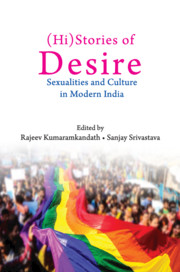Book contents
- Frontmatter
- Contents
- List of Images
- Acknowledgements
- Introduction: Sexuality and Sexualities
- 1 Politics of Prop Roots: Beyond ‘The Repressive Hypothesis’
- 2 Of Identities and Other Desires: Thinking about Sexualities
- 3 The Stuttered Process of Subject Formation: A Sex Worker's Experiments with Narration
- 4 Sexual Realism? (Hetero)Sexual Excess and the Birth of Obscenity in Malayalam Literature
- 5 Sexualizing Kālā Pāni
- 6 Memories of a Queer Sexuality: Revisiting Two ‘Toto’ Folk Tales
- 7 Learning about Sex in Mumbai: Rethinking the ‘Knowledge Gap’ Debate in Sexuality Education
- 8 Family Planning and the Masculinity of Nirodh Condoms in India
- 9 Women and Their Bodies: Menstrual Celebrations and Construction of Sexuality in Assam
- 10 Tanjai Prakash: Between Desire and Labour
- 11 Hijra Intimacies and Inheritances
- Notes on Editors and Contributors
- Index
4 - Sexual Realism? (Hetero)Sexual Excess and the Birth of Obscenity in Malayalam Literature
Published online by Cambridge University Press: 24 December 2019
- Frontmatter
- Contents
- List of Images
- Acknowledgements
- Introduction: Sexuality and Sexualities
- 1 Politics of Prop Roots: Beyond ‘The Repressive Hypothesis’
- 2 Of Identities and Other Desires: Thinking about Sexualities
- 3 The Stuttered Process of Subject Formation: A Sex Worker's Experiments with Narration
- 4 Sexual Realism? (Hetero)Sexual Excess and the Birth of Obscenity in Malayalam Literature
- 5 Sexualizing Kālā Pāni
- 6 Memories of a Queer Sexuality: Revisiting Two ‘Toto’ Folk Tales
- 7 Learning about Sex in Mumbai: Rethinking the ‘Knowledge Gap’ Debate in Sexuality Education
- 8 Family Planning and the Masculinity of Nirodh Condoms in India
- 9 Women and Their Bodies: Menstrual Celebrations and Construction of Sexuality in Assam
- 10 Tanjai Prakash: Between Desire and Labour
- 11 Hijra Intimacies and Inheritances
- Notes on Editors and Contributors
- Index
Summary
Introduction
The 1930s and 1940s were a period when the reform-centric language of Malayalam literature came under blistering attack from a group of authors who initiated a movement called Jeevatsahithyam – meaning literature close to life. This signified a new momentum in the career of modern Malayalam literature in Keralam in the southern part of India with social realism being introduced as a mode of challenging erstwhile trends. Jeevatsahithyam heralded a novel attempt to eliminate the distance between literature and social realities. Its authors deliberately opposed the hegemony of reform language in literature – a product of the late nineteenth century and early twentieth century reform movement. According to them, the language of the reform movement which continued to dominate Malayalam literature was clearly embedded in a vicious circuit consisting of caste, class, and morality. This, as it was commonly argued, was a stumbling block in the realistic representation of social realities in the realm of literature. Jeevatsahithyam was renamed in 1944 as Purogamana Sahithya Sangham (Progressive Literature Society – from here on PLS) (Chandrasekharan 1999; Kumaramkandath 2013). Openly declaring itself against the established morals operating then, its ideological base, however, had to be justified by incorporating the term ‘progress’ (purogamanam) in its title. Thus, in a larger sense, it signified progressive realism rather than simply social realism.
This chapter attempts to delve inside the debates around social realism in Malayalam literature where an ideological battle was staged in the regional public sphere around the questions of, broadly put, aesthetics and morality. It maps the discursive sequences of textual practices from the 1940s to the early 1970s when the depiction of desire in literature was a point of heated debates. I concentrate more on the early debates, particularly in the 1940s and early 1950s because they literally mediated between the rising social (progressive) realism's transgressive writings and the erstwhile reform concerns of ‘engendering’ disciplined subjects (Devika 2007). As a cultural era, the mid-twentieth century was deeply embedded in the old reform discourses of sexual discipline and the postcolonial euphoria of political freedom. The ensuing concerns over building the nation had a profound impact on the patterns of imagining the sexual in literature.
- Type
- Chapter
- Information
- (Hi)Stories of DesireSexualities and Culture in Modern India, pp. 58 - 78Publisher: Cambridge University PressPrint publication year: 2020

